Business travel industry participants compared notes at round tables of ABT-ACTE Russia educational case study
Travel managers, procurement experts and administrative staff, coordinators and other business travel industry participants gathered in the Garden Ring Hotel at ABT-ACTE Russia educational case study on February 4th. During the event the participants split into small groups and got an opportunity to discuss different matters of concern with experts, share experience with their colleagues, ask direct questions to providers and learn the latest news first hand. It was the second event in the new format for the Association — the first case study was held last October.
Head of corporate department of Aeroflot Anastasiya Shalnova suggested the participants expressed their problems, requests and suggestions related to cooperation with the air carrier. «Corporations frequently delegate all the communication with the provider to their agency. But due to different circumstances TMCs are not always able to answer questions that may appear. An extra link always leads to gaps in communication. So, if there are any issues that need to be explained, you may contact us directly», the speaker stressed.
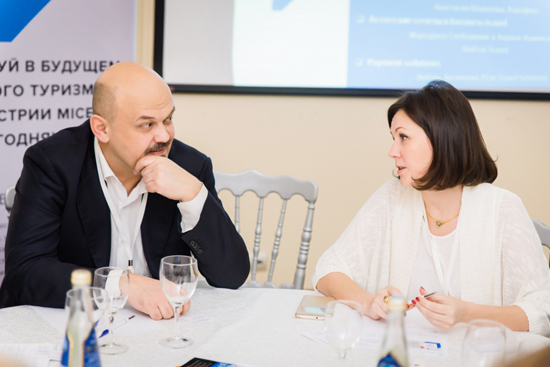
The opportunity to contact Aeroflot representative personally was very important for many participants. For example, one of the companies was waiting for the air carrier to prolong the agreement. Besides, case study participants learned about plans and news of the airline first hand. Thus, according to Anastasiya, the process of reimbursement for Transaero tickets will continue for another month, and in summer Aeroflot will launch a new travel route Moscow — Valencia.
Corporate buyers have noticed that the air carrier cut its fares to European destinations. «The drop in fares can largely be explained by the decrease in the passenger flow. Times are tough now, but Aeroflot was right to make a stake on transit routes some time ago, they are more profitable», the expert explained.
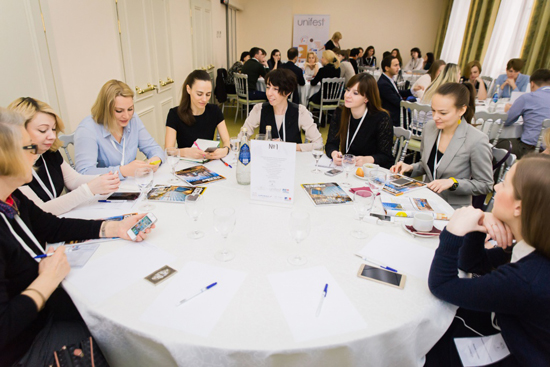
The experts discussed using open booking tools and hotel online booking services with Evgeniya Belenkaya, international development director of ACTE-BCHA program — international business and conference hotel attestation. The aim of the program is to integrate independent hotels and local chains into the global business travel industry. The project implies introduction of single standards for business hotels, which should provide greater comfort and safety for business travellers even in new or unstable regions (BRICS, GCC, MINT, SEA).
«If we speak about international experience, almost half of travel managers already use booking tools to book travel services for their personal trips, especially during the high season», Evgeniya said. Some discussion participants admitted that open booking was allowed in their companies, for example, for corporate card holders, as well as in cases when it could lead to economy«.
The expert named Expedia, Booking.com, HRS and Agoda as the key market players. One of the main differences between them is the fact they require advanced (Expedia) or delayed payment (Booking.com, HRS). Evgeniya gave several recommendations how to save money when you use online booking systems. For example, you should use meta search engines first to compare hotel prices on different websites. Such aggregators include HotelsCombined, Hotellook. Her another advice was not to forget about dynamic packaging opportunities: thus, if you book several services at a time at Expedia, for example, a flight and accommodation, the total price will be more advantageous.
Ms Belenkaya offered the participants a case study: «Imagine your commercial director calls you in the middle of the night and says he goes to the capital of Uganda in an hour and a half. Your task is to find suitable accommodation there as quickly as possible, and all you have is a smart phone with Wi-Fi».

After the participants found out the name of the capital of Uganda (Kampala), they coped with the task easily. Most participants used Booking.com and chose hotels belonging to hotel chains, as they counted on certified quality and certain standards. But what should you be guided by if hotel chains are not present in your destination? «Recommendations of friends, ratings and reviews in open sources, as well as intuition», travel managers suggested. Nevertheless, they admitted that most reviews and opinions were still biased. The participants also stressed that most independent accommodation objects matched hotel chains in their quality, and at the same time they were more flexible in their cooperation with corporate buyers.
«According to a report by Phocuswright, if the market share of hotel chains in the USA amounted to 70% some time ago, at present there is an obvious trend of growing popularity of independent hotels», the expert confirmed. «Besides, at the moment large international companies stop cooperation with international hotel chains, as they become targets of terrorist attacks, and accommodate their travellers in hotels of local brands that attract less attention. The exact aim of ACTE-BCHA program is to show that independent hotels are trustworthy as well, and to offer corporate buyers and business travellers reliable information based on attestation of every hotel».
The participants talked about payment solutions present in the Russian market with Lubov Vasilieva, sales director of FCm Travel Solutions in Russia and the CIS. The speaker gave a detailed description of the facilities of the new product eNett. «When you make a booking in GDS, a virtual card with a certain sum of money is generated for this very order. After the money is withdrawn from it, the card disappears. As for the customer, it looks like a simple non-cash invoice. Payment is made through the agency, we refill the card as well», Ms Vasilieva explained. «Due to this you can use your global hotel program. Unlike situations, for example, when a business traveller has to pay for accommodation during his business trip with his personal card, which is not safe as well. As far as I know, there are no more solutions like that in the Russian market at the moment. vPayment by American Express can be used in cases just like this, but this tool is available only in foreign currencies so far».

The expert stressed that at the moment the preferred payment method both for corporate buyers and the agency was still BTA that solves the problem of customer crediting. In the expert`s words, the fuss about open fees and high commission is not without reason. Corporate credit rate is 22% at present. Customers should understand that it causes losses to a TMC. In January Russian carriers cancelled agent commission and bonuses. Thus, the only revenue of a TMC is now a service fee charged when railway and airline tickets are issued.
Business travel sales director of UniFest Margarita Slobodyanik and online project director Kirill Faminsky spoke about agent reports that help motivate business travellers to save their business trip costs. «When we looked back at the year, we noted that a report we introduced only four months earlier was the most popular with our customers», Mr Faminsky stressed. «We have chosen three main criteria for it: ticket purchase depth and benchmark (i.e. comparison to the market) for airline tickets and hotels. Travellers get points according to these criteria. In such a way we can assess the degree of travel policy compliance and the potential of extra economy for the company in general as well as for every employee in particular. How many points did he get? And how many could he have got?»
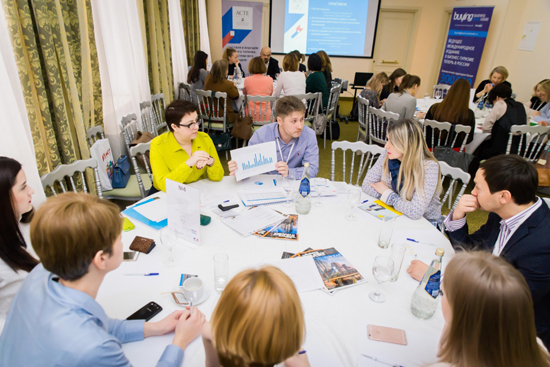
«Even if a business traveller does not infringe his travel policy rules, he can purchase an economy class airline ticket for 20 as well as for 70 thousand roubles. It is important to understand whether he is near the top of his limit or somewhere in the middle», Ms Slobodyanik explained.
The experts suggested using points as a base for non-financial recognition of employees, for example, appraisal of the most thrifty ones, or transferring points into airline tickets or discounts for personal trips.
Discussion participants noted that you could not use such a practice, say, for top managers, because companies are usually guided by their preferences. «Even an airline ticket as a bonus among other things can hardly be interesting for chief executives. This analysis is really applicable for ordinary employees only», Margarita agreed.
Many travel managers also said that there already were serious limitations of travel policy in their companies and its compliance was strictly controlled. «It is right, but you are speaking about prohibitive measures, while we suggest you started from motivation», Kirill summed up.

«Communication with TMCs apart from tenders is always interesting, you learn something new every time. For me personally the topic of agent reports from the point of view of statistics and analytics was extremely informative. It would probably be useful to develop it further at one of the next meetings and to make an ideal list of reports», Inna Alshevskaya, head of administrative department of Media-Saturn Russia noted. «In general, the meeting was very useful, and in the first place due to its format, because live communication at a round table allowed us to compare notes on many issues. Everyone is interested in the way his colleagues manage this or that process, in order to learn and to compare it with the way it works in their company».
Special aspects of visa issues were explained to case study participants by the representative of the Embassy of France in the Russian Federation Florent Fassi, Vasily Loginov from the French visa centre and director of the French Tourist Office Inessa Korotkova.
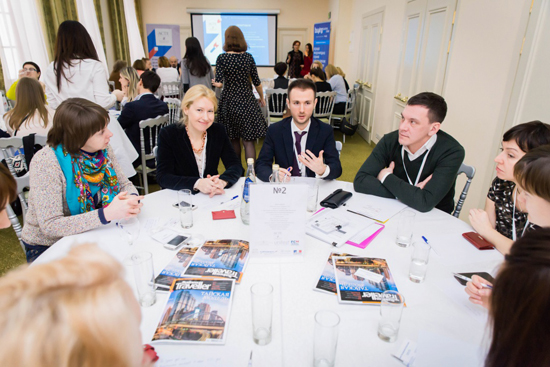
The most burning is the question how to get a long-term visa. But there is no single recipe for everyone in this case. According to Mr Fassi, the number of visas issued by the Embassy of France is steadily growing: «We often issue the first tourist visa for not more than 90 days of stay during 6 months. The next time — for a year, and so on. At the same time you do not need to have all the French visas to get a 5-year visa».
Nevertheless, the stamp itself is not the only thing that matters. As Vasily Loginov stressed, a good visa history is a key to success. Besides, Embassy employees take into account passport expiration date. «If your passport expires in 2018, you will not definitely get a 5 year visa», Mr Fassi noted.
«When you get a visa for your employees, it is recommended to get a confirmation from your business partners in France as a letter stating you have long-term cooperation. It may help», Ms Korotkova gave her recommendations.
Business visas account for 10% of all the visas issued by the Embassy of France. And there is only 1% of refusals. «At the same time those who are denied a visa include very few business travellers», Florent said.
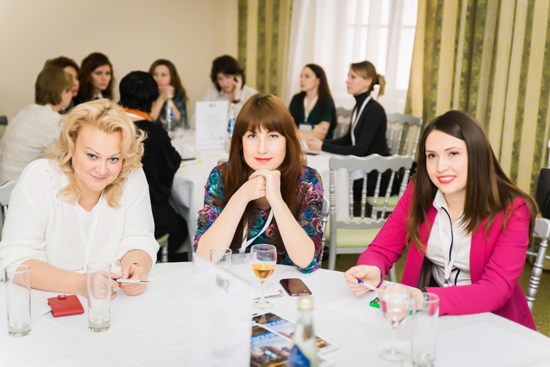
Case study participants were glad to know that now those who go to France could file documents for an express visa. «The French visa centre has never worked with express visas. But now they have such a function — you may file your documents 2-3 days before your trip if you have tickets already. A double consular fee, 70 euro, is charged for this service», Mr Loginov explained.
«We hope we will be able to offer business travellers an opportunity to get a visa within not more than 2 days by the end of this year», Mr Fassi said.
The experts asked case study participants whether the number of business trips to France had dropped in their companies because of the crisis. According to corporate buyers, business trips to France have not become less frequent, but the number of travellers and the length of stay have decreased.
«The session on visa support was very useful, because we could learn the latest news of the visa front first hand», head of administrative department of PSN Group Svetlana Vladagina said. «The experience in motivating staff described by UniFest Travel was also very interesting».
«I got a lot of new information on issues that arise in my routine work from time to time. The most interesting topics for me were special aspects of applying for a Schengen visa to France, because the experts spoke about visa application options I did not know about before. Colleagues from UniFest suggested an interesting idea of staff motivation through air travel cost cutting and a system of points for every employee», senior travel expert of BBDO Group Ekaterina Garina shared her opinion. «I also liked the new event format. We have got an opportunity to build a dialogue with the speaker, and you could simultaneously hear you fellow colleagues` opinions».
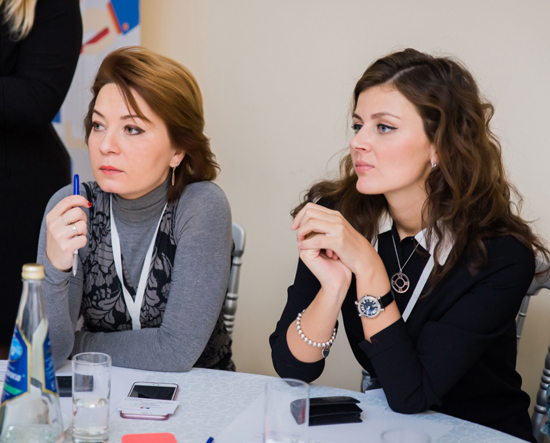
«I liked the new format of the event very much, because, first of all, it lets discuss matters of concern in more detail and in a smaller company, and second, hear what my colleagues are worried about. Especially as the round tables have gathered representatives of various industry sectors. And third, we could establish closer contacts both with the speakers and with the participants of the discussion», head of administrative department of RTSoft Irina Bodrova said.
«In my point of view, the meeting organized by ABT-ACTE Russia was very efficient. We received information on the latest trends and new products in the market, could find answers to the questions we were interested in. We had an opportunity to talk to colleagues, to establish new contacts. The format of the event was the most attractive for me — it has added an interactive component and helped both the participants and the speakers to dwell on the topics announced in more detail», senior business travel expert of Shell Anna Zvenigorodskaya stressed.
«We started holding case studies not long ago, it has been the second event for ABT-ACTE Russia in this format. We will take the previous experience and participants` opinions into account, making this format more efficient in the future», executive director of ABT-ACTE Russia Ekaterina Aleksandrova said.
Natalia Travova